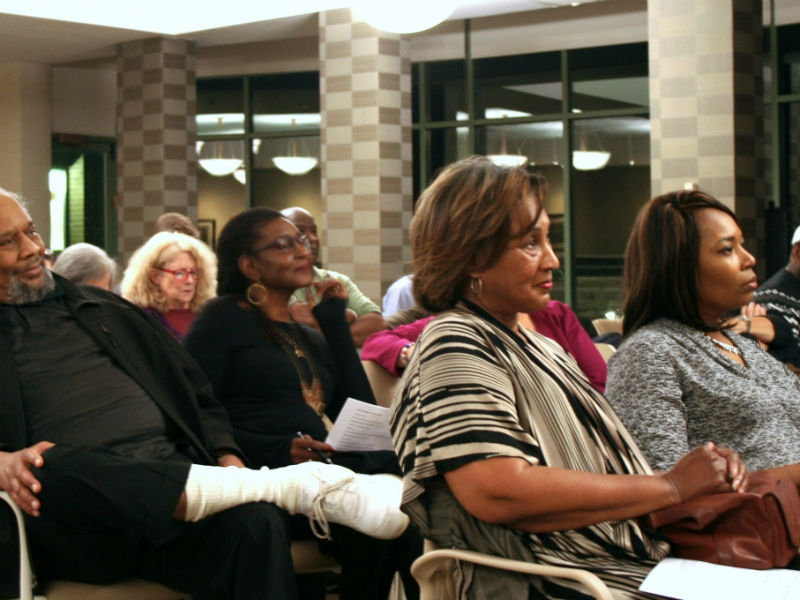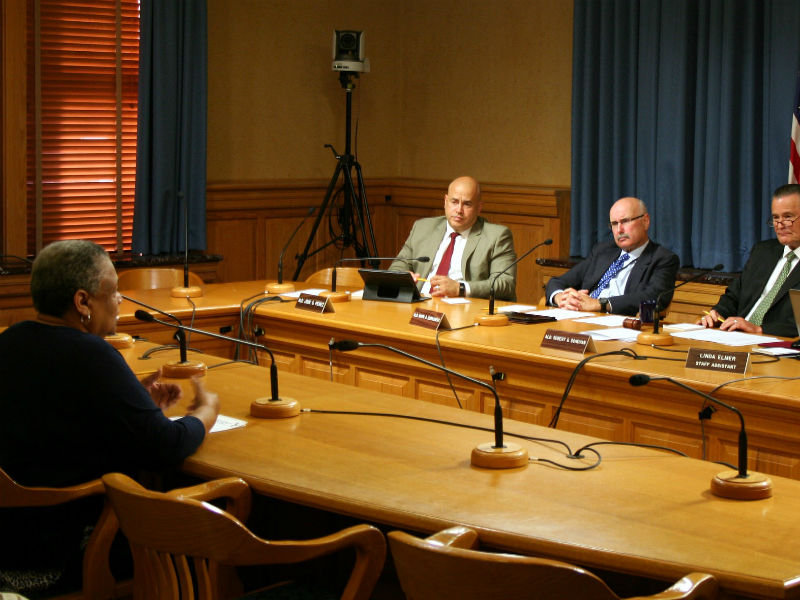It's a postcard-perfect summer Friday afternoon the South Side. It's payday, and the boss is so happy with your work that he let you out of the office a couple hours early.
The timing is perfect.
Some friends you haven't seen in ages are visiting for the weekend, so you jump in the car and head for the grocery store to pick up brats and buns for the backyard barbecue.
Rush hour hasn't started yet, so the roads are clear. The sun is shining, the windows are down and your favorite song just came on the radio. You reach for the volume knob, ready to crank up the radio and get the weekend off to a proper start.
With spirits soaring and the bass thumping, you glance at the rear-view mirror and see a Milwaukee Police Department squad car with its red lights flashing. As you maneuver to the side of the road to get out of the way, you realize that the car being pursued is yours.
Your heart races. Your throat tightens. Your mouth goes dry. You go through the mental checklist:
I wasn't speeding.
I didn't make an illegal turn.
The registration sticker on the corner of my plate is up to date.
As the officer approaches, you reach for your driver's license and turn down the volume on your favorite song.
Too late.
You've been "bass-busted," and it's going to cost you $237.
Under a new program introduced by Ald. Bob Donovan, chair of the Common Council's Public Safety Committee, Milwaukee police have begun issuing tickets to motorists who blast their stereos at nuisance levels. If your tunes are audible at a distance of 50 feet, you're eligible for a ticket.
"Complaints about excessively loud music generated by car stereos is at the very top of the list when it comes to calls to my office, and I'm very pleased that police are addressing this very important quality of life issue," Donovan, who represents the 8th District, said in announcing the Bass Busters program, which draws its name from the booming bass sound emanating from many car stereos.
Donovan's inspiration came from a news report about a similar program in Racine, where officers use decibel-measuring detectors to identify excessively loud car stereos.
"When I saw the reports I thought, ‘Why isn't this being done here?'" Donovan said.
OnMilwaukee.com got an exclusive look at the new program during a "ride-along" with Officer Mark Lelinski on Friday. We met Lelinski at District Six headquarters, 3006 S. 27th St., where we signed a few waivers and grabbed a bullet-proof vest (standard procedure for ridealongs) before heading out for the fight against noise pollution.
"Virtually everybody listens to the stereo when they are driving their car," Lelinski said. "They're either listening to talk radio or they've got music on the radio or with a CD or their iPod.
"Most of the time, you can't hear it."
Lelinski proves his point at a stop light. Idling next to a man in a black convertible, he hollers: "Is your radio on?" When the man shoots him a confused look, Lelinski asks again: "Are you listening to the radio?" The man nods. "Thanks!" Lelinski said.
"The people that crank their stereos with these big speakers in the trunk are the people we're after," the officer said. "There is nothing wrong with listening to music. It's just that other people shouldn't be forced to listen to your music at high volume, especially late at night. I wonder how some of these people would like it if I was in their neighborhood cranking my Frank Sinatra."
Noisy car stereos may not seem like a big deal, but they do impact the quality of life. A sergeant at District Six headquarters told a story of an elderly woman who lived near 27th St. and Burnham St. "In an eight-hour period, she had 30 instances where people passed her house with stereos blasting," the sergeant said. "Her walls were shaking."
By the time we join Lelinski, he had already written two tickets. One was for a 28-year-old African-American male; the other was a 19-year-old Hispanic female.
"It's mostly younger people we get," said Lelinski, who works with kids at more than 50 Milwaukee Public Schools from September to June. "A lot of old people either listen to talk radio or don't crank up their music. Most of the people we're coming across are younger."
On Friday, the Bass Buster operation appeared a lot like a speed enforcement zone. Lelinski parked the squad car on the side street just east of busy Layton Blvd. and grabbed his UltraLyte LR B laser. That device, about the size of a hair dryer, is used to detect speeders.
"The great thing about this is that it can tell you how fast cars are going, but it also measures distance," Lelinski said. "The ordinance says that if your stereo is audible at 50 feet, you're breaking the law. Fifty feet isn't very far."
Lelinski aims the laser at a series of trees adjoining the sidewalk in both directions. "The second tree there is 47 feet from us," he said, looking south. "The third tree is about 105 feet."
With our "guiding" trees established, we sit back and wait for offenders. Lelinski mentions that noisy stereos often lead to other crimes.
"People with big, expensive stereos are advertising what they have," he said. "People hear the music, follow them home and the next thing you know, we're doing an auto theft report. Their windows are smashed and the stereo is gone or else the car is gone and we find it a week later, stripped.
"If you flaunt what you've got, you're more likely to be a victim."
Lelinski also said that people who are pulled over for noise violations often have outstanding warrants or other problems.
"You're bringing attention on yourself," he said. "I pulled over a woman and she had no license and no registration."
Lelinski swings into traffic, but the car is about a half-mile ahead of us. "Once we hear them, we have to catch them," he said, hitting the accelerator. A stoplight is about to turn red, but Lelinski slows down slightly, hits his siren momentarily and we cruise through it and accelerates again.
Moments later, the driver of the Altima pulls over and Lelinski heads out. After a short conversation with the driver, he returns with the man's license.
"That was a classic," Lelinski said, laughing as he enters the driver's name and license number into the squad car's computer. "I asked the guy, 'Do you know why I'm stopping you?' and he said, 'Hold on' and he had to turn his radio down because he couldn't hear me."
The driver's record comes up clean and Lelinski begins writing out the $237 ticket and notices that the driver's brake light is burned out. "I could write him for that, too, but the kid was very cooperative and polite. I'll just tell him to get it fixed."
Lelinski said most of the people caught in the Bass Busters operation have been cooperative. "We don't get a lot of guff from people," he said. "Part of that is because it's the afternoon right now. People can be different at night, when they've got a few beers in them and they've got some of their buddies in the car and they want to look cool.
"Right now, people have been pretty good. A lot of them are surprised to be getting to be getting the ticket. A few people will say ‘You don't like me because I'm Hispanic,' or ‘You don't like me because I'm black.' Or ‘You just don't like my music.' I always tell them, 'It's not that I don't like the music. It's just too loud.'"
Lelinski issues the ticket to the driver and we head back to our hiding spot. At a stoplight, we hear loud music from a distance. It's not 50 Cent or Metallica. It's the unmistakable sound of an ice cream truck blaring a children's song.
That begs an obvious question: Are ice cream trucks being targeted by police?
"Not right now," Lelinski said. "That's not part of the program. I'll tell you what, though -- if I was in the middle of my afternoon 'grandpa nap' and one of those guys drove by, I'd find it pretty annoying."
What about motorcycles? A modified Harley-Davidson can crank out more decibels than a car stereo.
"We're not targeting them yet, either," Lelinski said. "But, they can get loud, too."
Within a few minutes, a red Dodge Neon drives by with the radio blaring. It is audible outside the 50-foot range, so Lelinski swings into action, follows the car down a side street, hits his lights and the driver pulls over.
The woman named Tabitha was just a few blocks from her home and had children in the car; a girl in her early teens up front and a small child in the back seat.
Tabitha hands Lelinski a state I.D. card, but does not possess a driver's license. The registration for the car, which is owned by her husband, has expired. A computer check shows that Tabitha has no warrants or record, but Lelinski writes her tickets for the noise violation, driving without a license and the expired registration.
While Tabitha waits for her citations, an ice cream truck passes by on 25th St., playing its usual song at a volume louder than her car stereo. The irony is remarkable, but Tabitha has other things on her mind. Had she not been blaring the radio, she wouldn't have received any of the tickets. Because she doesn't have a license and lives only a few blocks away, Lelinski has her park the car and walk home.
On this day, cranking her radio turned out to be both expensive and inconvenient. But, her neighborhood is a little quieter.
Host of “The Drew Olson Show,” which airs 1-3 p.m. weekdays on The Big 902. Sidekick on “The Mike Heller Show,” airing weekdays on The Big 920 and a statewide network including stations in Madison, Appleton and Wausau. Co-author of Bill Schroeder’s “If These Walls Could Talk: Milwaukee Brewers” on Triumph Books. Co-host of “Big 12 Sports Saturday,” which airs Saturdays during football season on WISN-12. Former senior editor at OnMilwaukee.com. Former reporter at the Milwaukee Journal Sentinel.







